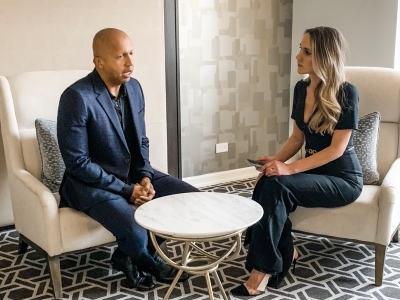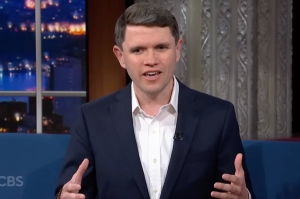Bryan Stevenson: The Epitome of the Good Samaritan

As a client of Bryan Stevenson, whose life is featured in the new film "Just Mercy" (Jan. 10), I have been able to have a different view of him for the past 12 years. The media and public have been able to see the amazing work that Bryan and the Equal Justice Initiative (EJI) have been doing for the past 30 years and being enamored with his incredible oratory skills.
I have seen the three points from the parable of the Good Samaritan daily. In this parable, you have a Jew who was traveling and fell amongst robbers who stole all his goods and pummeled him, leaving him to die. There were two religious leaders who came by and saw the man but went about the business without giving this man a second thought.
This is from Luke 10:33-35: “A Samaritan traveling the road came on him. When he saw the man’s condition, his heart went out to him. He gave him first aid, disinfecting and bandaging his wounds. Then he lifted him onto his donkey, led him to an inn, and made him comfortable. In the morning he took out two silver coins and gave them to the innkeeper, saying, ‘Take good care of him. If it costs any more, put it on my bill — I’ll pay you on my way back.’
The Good Samaritan did three main things that changed the life of the man who had been robbed. Bryan has done and continues to do these three things. They both 1) Saw something 2) Felt Something and then 3) Did Something. The Good Samaritan saw that the man was in need. He felt compassion and sorrow for this man and his state. Then he performed first aid, lead him on his donkey to an inn, and then paid for his stay at the inn until he was well. Without this man, he would have surely died.
When Bryan first walked into the Georgia prison and met his first death row inmate, he saw that there was a need. This is what began to churn the passion and desire to help the marginalized and outcast. He saw someone his own age and with the same background. This rocked him to the core. Bryan also saw youth arrested and being housed with adults. He heard stories of what the other incarcerated individuals and the prison staff did to these individuals. He saw my brother and me, the way that the system did not properly investigate our allegations, and the way that our lawyers didn’t fully fight for us. They were content on pleading us out. Recently, Bryan has seen that there was nothing being said or done about the lynchings that occurred. He took the time to notice all of this and to be proximate.
Bryan is a man of empathy. He feels deeply and resonates with his clients. He doesn’t just work with them, helps them and then discards them. He is someone who will continue the journey with them upon their release. His empathy began there on death row in Georgia. It continued to develop and grow when he began working with Walter McMillian, Anthony Ray Hinton, Herbert Richardson and others on death row in Alabama. His ability to feel the pain and hurt of others is what makes him the person he is, but also a wonderful lawyer who can cause the judge and jury to feel everything that clients endured in life and the harm of their imprisonment. His upbringing in the faith prepared him for his calling and gave him the ability to feel.
Just Do it! This should be the motto and brand of Bryan Stevenson, because he has been doing it for over 35 years and there is not going to be anything that will be stopping him anytime soon. In Alabama, there had never been someone on death row who had been exonerated, Walter McMillian was the first and there have been others that followed. Most recently, in 2015, Anthony Ray Hinton was exonerated by the work of Bryan and EJI. Bryan has won numerous Supreme Court cases, most importantly the cases that stated that juvenile life without parole sentences were unconstitutional. This has freed hundreds of people across the country. EJI has created The National Memorial for Peace and Justice and the Legacy Museum to bring light to all of the lynchings that have occurred in our country. Bryan helped my brother and me obtain parole. He then assisted me with getting into college.
Bryan is a superhero. There are people in law school or in high school who have read his book and are getting ready to see "Just Mercy" (Jan. 10) in theatres who want to be just like him. This is AMAZING. He has had such an impact on my life and that is why I am involved in criminal justice reform in Pennsylvania. I am now being like him; I See Something, I Feel Something and I Do Something.
Growing up and at Eastern University, Bryan heard a verse from Micah 6:8 that is still his challenge to this day. “Do Justice. Walk Humbly. Love Mercy.” We all will be challenged as we see the movie, “Just Mercy,” please be like Bryan and the Good Samaritan. There are people in need and you have the time, talent and the treasures to help them. If you need help in finding ways to get involved, reach out to www.eji.org and they will help you connect with organizations in your area that are doing work in criminal justice reform.
David L. Garlock is a successful returning citizen, reentry professional, and criminal justice reform advocate. David and his brother received 25-year sentences in Alabama after taking the life of their abuser. A client of Equal Justice Initiative, he was released on parole in 2013 after serving more than 13 years and pursuing several educational opportunities while incarcerated. He subsequently obtained his bachelor's degree from Eastern University and is now the Lancaster Program Director for New Person Ministries, a reentry program for men who have committed sex offenses and other returning citizens. He is also Co-Chair of the Lancaster County Reentry Coalition; a member of the Pennsylvania Reentry Council, a statewide coalition of county reentry organizations; and a Healing Communities facilitator. He is a frequent speaker at colleges and universities, criminal and social justice conferences, and community events. He also has a cameo in the movie Just Mercy about Bryan Stevenson. David resides in Coatesville, PA with his wife, where they are dedicated to serving with their local church, Freedom Life.



























